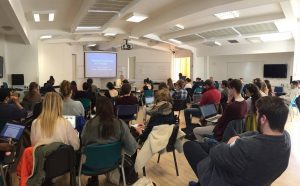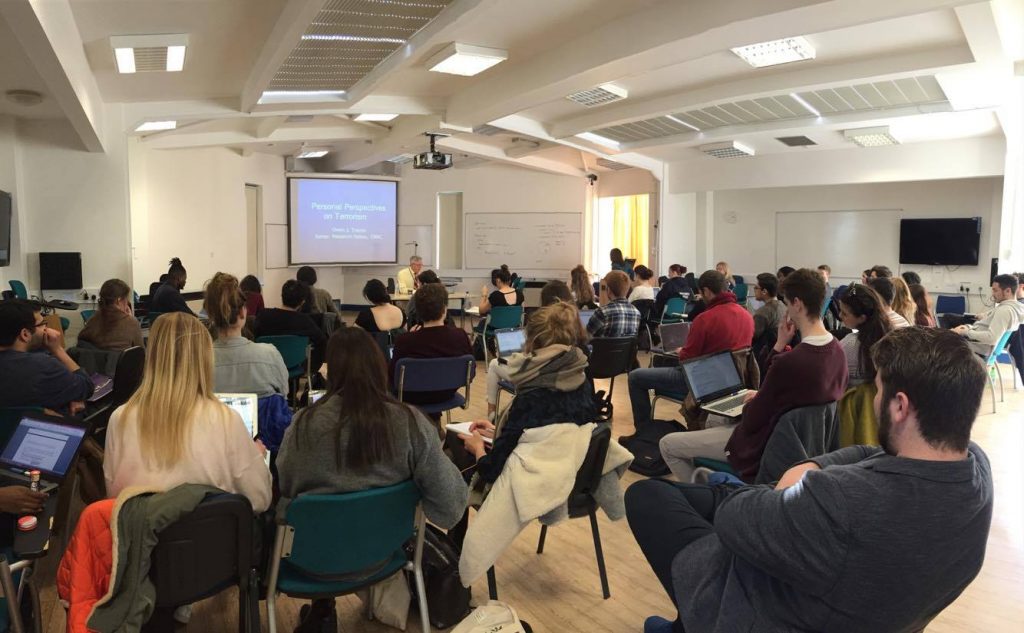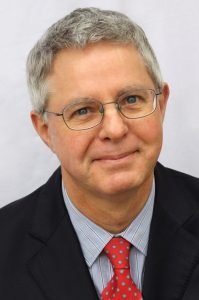 Owen Traylor, Senior Fellow of CARC, visited Kent for three days to engage in a series of employability talks on careers in the foreign service and giving a guest lecture on his experience in the third-year undergraduate module Humans at War. Traylor served for more than three decades in the British Foreign Service, including on the Cabinet Office Committee on Northern Ireland in the run-up to the Good Friday Agreement, in Turkey, Japan and Israel.
Owen Traylor, Senior Fellow of CARC, visited Kent for three days to engage in a series of employability talks on careers in the foreign service and giving a guest lecture on his experience in the third-year undergraduate module Humans at War. Traylor served for more than three decades in the British Foreign Service, including on the Cabinet Office Committee on Northern Ireland in the run-up to the Good Friday Agreement, in Turkey, Japan and Israel.
CARC intern Adriana Jones Lima had the chance to meet with Mr. Traylor to discuss his diplomacy experience, his advice for politics students, and the future of conflict resolution.
Q: What drew you to a career in diplomacy?
A: My father was in the Royal Navy and my step mother was a civil servant as well. I grew up in an atmosphere where the public sphere was natural and the private sphere wasn’t natural. It was all around me. It is odd but I always liked the idea of immersing myself in another culture. I loved foreign languages. In my A levels I did all three languages and went on to pass all three. During my A levels I practiced French by reading Le Figaro, a newspaper and started to pick up on the political issues in it. This helped develop my understanding of international issues and politics. I then went on to go to Cambridge, there I studied Law. By my 3rd year of my law degree I realized I didn’t want to go into a law. So instead of taking family law classes I focused on classes that would help with foreign service.
Q: What advice do you have for students looking to go in to diplomacy?
A: My advice would be what I would say to any graduate. Recruitment is a two way process. You have to make an impression on them but they also have to make sure they are impressing you as well. Students need to be clear if diplomacy is what they are looking for. Be attracted to the upsides but aware of the downsides
Q: What would you say are the upsides and downsides of a career in diplomacy?
A: In terms of the upsides, in the early stages you are moved where you’re sent. This is called the mobility requirement. If you do not want to go abroad or only want to go where you want to go, this is not the career for you. With the movement it is hard to maintain relationships, even with social media, FaceTime, Skype. Your life becomes a bit like a balloon that you twist into. You have your life abroad and then home with barely any connection between the two. It will be like this your whole career.
Some places will be really nice and some will not. Visiting a colleague in Ghana, no electricity, it was boiling hot inside the house. My colleague came to greet me at the door in shorts drenched in sweat. I met him with a rubber tire for his son’s bike since it was impossible to get one there. People assume diplomats are molly coddled everywhere they go but this is not the case. Now there are also security issues in some places, making it too dangerous to take your family along with you. Also a career in diplomacy can be very disruptive to family and children life and education. One needs to have an interest in IR more than just the average citizen. Also one must be adaptable, flexible, operate more or less on their own and work with lack of support. One needs to be a self starter and be able to demonstrate these abilities.
Q: Touching on the new security issues facing diplomats, can you talk about how security in diplomacy has changed from when you first started working to now?
A: It is certainly more of an issue now. There are increasing incidents of terrorism and different kinds of threats now than when I first started. In the 70s hijacking planes was the biggest security threat, (not to crash them but more to get what they wanted). What happened in Istanbul wouldn’t have happened at the beginning of my career. There was no Al Qaeda it just wouldn’t have occurred. There was much less security at the embassy. There was no such thing as counterterrorism in my first 10 to 15 years, there weren’t security briefings. Now even businessmen have to take counterterrorism courses as well as diplomats.
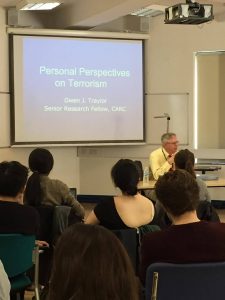
Q: What would you say is the biggest challenge facing UK diplomacy?
A: The biggest challenge for the UK diplomacy is to continue to be relevant. Britain is faced by concerns none of us expected after Brexit. I went to talk recently by the new British Ambassador to Japan and he stated that his principle concern is to remain commercial. 20 or 30 years ago the Ambassador would have never sputtered those words. Diplomacy was still focused on political relationships. Negotiation is a form of diplomacy. There will also be other issues after Brexit. The UK relied on the EU for negotiation. Working outside the cozy confines of the EU will be a challenge. We could then speak with the force of 27 countries with 500 million people. Now we will negotiate as a relatively small country with a strong economy, it will be a new and another challenge in the fight to stay relevant.
Q: What would you say will be emerging issues in the next 5 to 10 years? Or even farther than that?
A: Climate change will be an issue. None of us know how that will pan out. With the arctic melting we know Pacific Islands will start disappearing and coastlines will change. The Trump administration’s decision to be unwilling to follow the Paris Agreement will be an issue.
There will be a successor to ISIS. I don’t know who it will be or what it will look like but something will take their place.
I predict the biggest problems, I am not saying this as an economist, will be economic slowdown of Chinese economy. Slow down in growth rates all around. This will be lead to declining living standards.
Q: What would you say is the biggest lesson you’ve learned through diplomacy?
A: Trying to see the other person.
Q: Can you talk a bit more about that? I know the other day you mentioned that you have forgiven the young man who drove the truck in the consulate you worked at in Istanbul. Did you learn that through diplomacy or was that something you learned after the attack?
A: It wasn’t forgiveness but I didn’t hold any animosity toward him. The point is he is another human being. Seeing another human being doesn’t mean accepting what they think or do. One has to accept that they have the right to their point of view, even if I don’t agree with it.
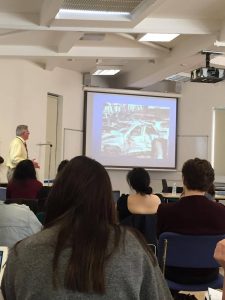
Q: What is a failure you experienced in your diplomacy career? What did you learn from it?
A: A general failure I would criticize myself for is being too detail oriented. The big picture is important for making progress. It is important to not get lost in the weeds but to look at the horizon. One specific example was a particular incident in which I failed to see another’s point of view early on in my career. I was so bent on my ambitions on a particular project and my stake in it, that I dismissed the point of view of the other stakeholder. It was hard lesson to learn. I paid greatly for it.
Q: Yesterday you mentioned that you should never take anything at face value? In our current context we are living in a time with fake news, alternative facts, media agendas, how can students and civilians delve deeper into issues and go beyond face value?
A: This didn’t all start with Trump, in fact I had advised my students to not take anything at face value for years before this. The Trump concept of truth has exacerbated what was already there. When looking at written or spoken word see it as what it is. See it as somebody else’ intent. No matter who is writing or speaking they will have a judgment. Everyone has an agenda. My advice would be to see where this coming from don’t take it as gospel. Almost literally try to peel the word behind to see the intent. Selective facts are almost as bad as alternative facts.
Q: That is all for my questions any final thoughts, anecdotes, or last pieces of advice?
A: My final thought has to do with something I touched on yesterday. Nelson Mandela was considered to be a terrorist. There is a historical perspective that comes with time. The world is not black and white but has shades of grey and that only comes with time, and that is immutable. An appreciation of that and understanding of that in advance would ease the suffering that comes with that transition.
